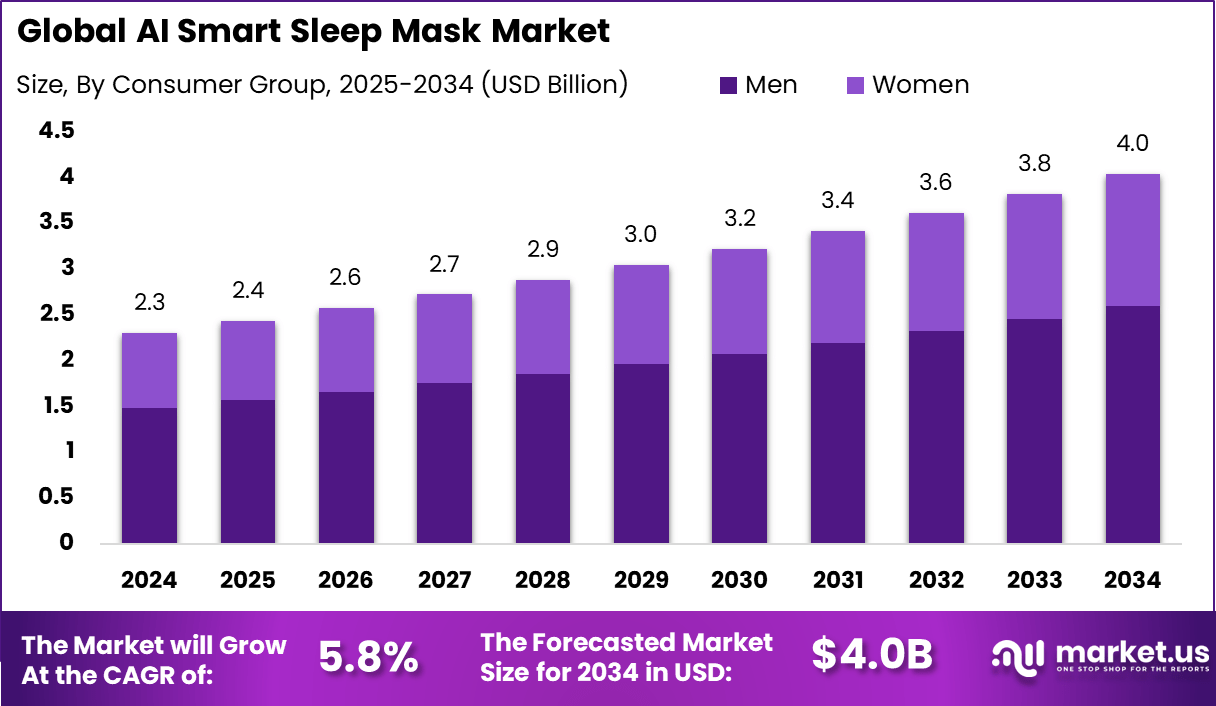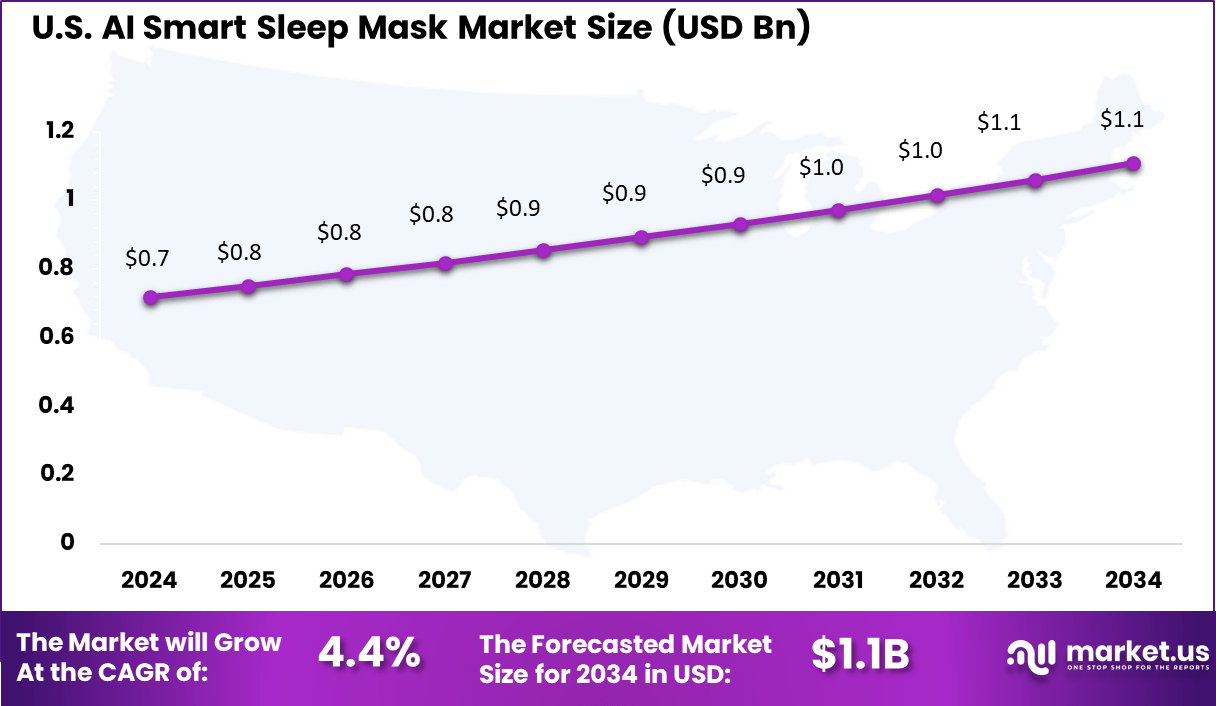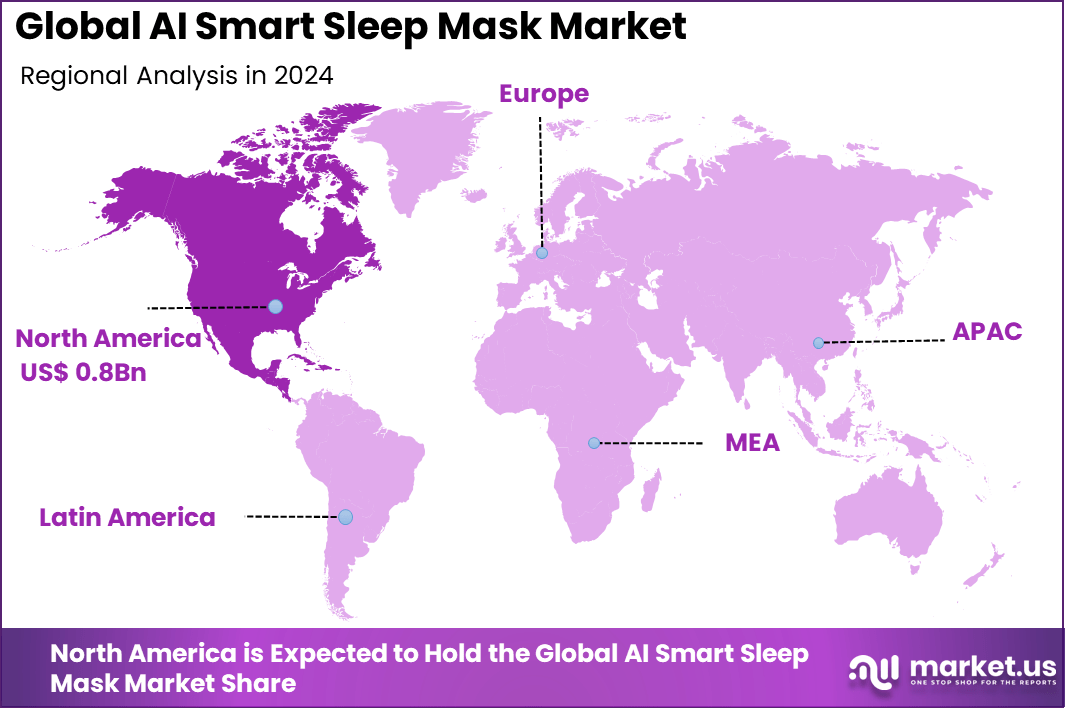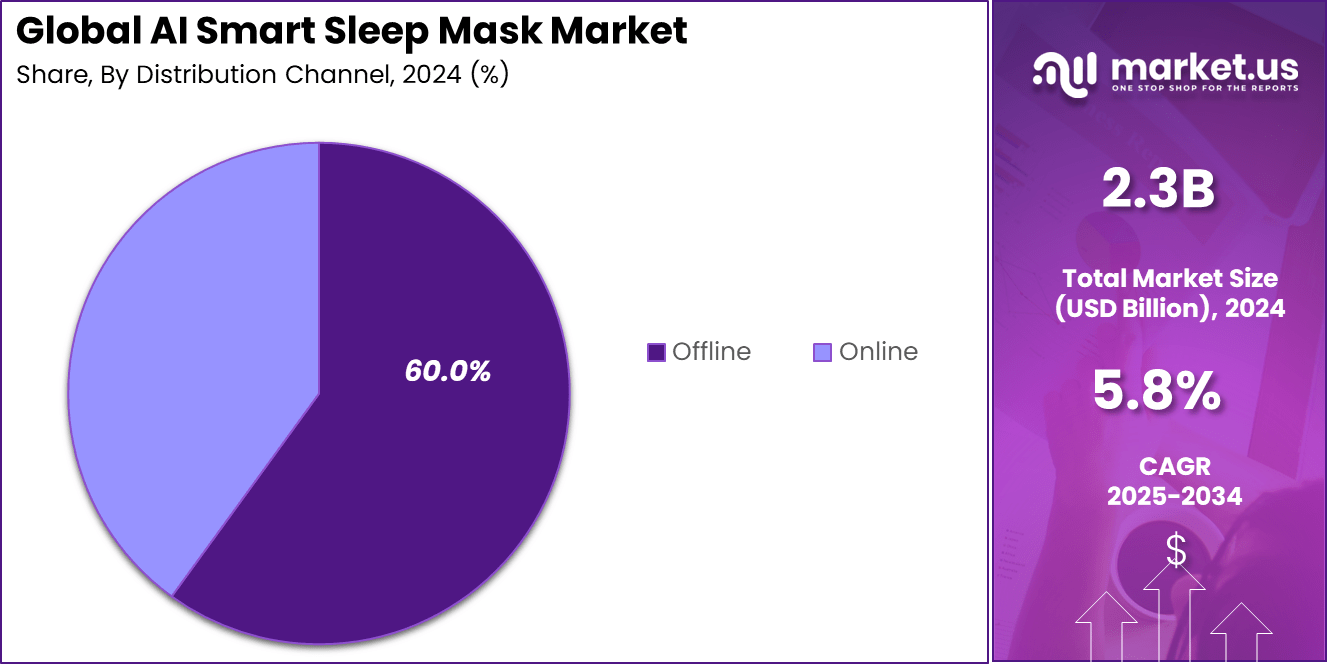Global AI Smart Sleep Mask Market Size, Share Analysis By Product (Regular, Contoured, Wrap Around, Others), By Technology (Deep learning, Natural Language Processing, Computer Vision, Context-Aware Computing, Others), By Consumer Group (Men, Women), By Distribution Channel (Offline, Online), By Region and Companies - Industry Segment Outlook, Market Assessment, Competition Scenario, Trends and Forecast 2025-2034
- Published date: August 2025
- Report ID: 155077
- Number of Pages: 253
- Format:
-
keyboard_arrow_up
Quick Navigation
- Report Overview
- Key Insight Summary
- Role of AI
- US Market Size
- Top 5 Trends and Innovations
- Top 5 Growth Factors
- By Product – Regular (38.6%)
- By Technology – Deep Learning (35.4%)
- By Consumer Group – Men (64.4%)
- By Distribution Channel – Offline (60.0%)
- Key Market Segments
- Driver Analysis
- Restraint Analysis
- Opportunity Analysis
- Challenge Analysis
- Competitive Analysis and Coverage
- Recent Developments
- Report Scope
Report Overview
The Global AI Smart Sleep Mask Market size is expected to be worth around USD 4.0 Billion By 2034, from USD 2.3 billion in 2024, growing at a CAGR of 5.8% during the forecast period from 2025 to 2034. In 2024, North America held a dominan Market position, capturing more than a 36.7% share, holding USD 0.8 Billion revenue.

The AI Smart Sleep Mask Market is evolving as a niche segment within the broader sleep aid industry, driven by the increasing awareness of sleep health and the integration of advanced technologies aimed at improving sleep quality. These smart sleep masks combine traditional light-blocking features with cutting-edge technologies such as sensors, AI-driven sleep tracking, temperature regulation, and soothing sound functions.
Key factors fueling the growth of this market include rising concerns about sleep disorders and the growing emphasis on mental and physical well-being. The stressors of modern life, prolonged screen exposure, and irregular work schedules have elevated demand for sleep aids that do more than just block light. AI-enabled masks monitor sleep, provide relaxation, and adapt in real time for a holistic sleep experience.
Market Size and Growth
Metric Statistic / Value Market Value (2024) USD 2.3 Bn Forecast Revenue (2034) USD 4.0 Bn CAGR(2025-2034) 5.8% Leading Segment By Distribution Channel – Offline: 60.0%” Leading Region Share North America [36.7% Market Share] Largest Country U.S. [USD 0.72 Bn Market Revenue], CAGR: 4.4% Investment opportunities abound in this market as demand for health-oriented, smart consumer devices rises globally. The increasing shift towards wellness and self-care, combined with advancements in wearable technology, opens avenues for innovation and differentiation. Markets with high digital adoption and growing health awareness present lucrative prospects for product launches and expansions.
Business benefits from AI smart sleep masks extend beyond product sales to encompass enhanced customer loyalty and brand differentiation. Offering intelligent features that deliver measurable health benefits helps brands build trust and long-term relationships with users who value personalized wellness solutions. The integration of AI also allows for the development of subscription services and software updates that increase revenue streams and customer retention.
Key Insight Summary
- The market is expected to grow from USD 2.3 billion in 2024 to around USD 4.0 billion by 2034, registering a CAGR of 5.8%, driven by rising consumer interest in AI-powered wellness and sleep optimization products.
- North America led the global market with a 36.7% share, generating USD 0.8 billion in revenue, supported by high health-tech adoption and strong retail presence.
- The U.S. market accounted for USD 0.72 billion in 2024 and is projected to grow at a CAGR of 4.4%, reflecting steady demand for premium AI-enabled sleep solutions.
- By product type, Regular smart sleep masks captured 38.6%, favored for their affordability and wide accessibility.
- Deep learning technology held a 35.4% share, enabling personalized sleep pattern analysis, adaptive light therapy, and AI-driven relaxation features.
- Men represented the largest consumer group at 64.4%, indicating higher adoption rates among male users, particularly in wellness and productivity-focused segments.
- The Offline distribution channel dominated with 60.0%, as consumers prefer in-store product trials and direct consultations before purchase.
Role of AI
Role/Function Description Personalized Sleep Tracking AI collects and analyzes sleep pattern data to offer tailored recommendations and adaptive sleep programs. Biofeedback Integration Real-time monitoring of physiological signals (e.g., movement, heart rate) for sleep stage detection and improvement. Adaptive Sensory Therapy AI controls light therapy, soothing sounds, vibration, or aromatherapy to optimize sleep onset and quality. Connectivity & Smart Integration AI powers integration with smartphones, apps, and smart home devices for seamless data logging and environment control. Enhanced Comfort & Design Optimization AI assists R&D for ergonomic, lightweight, and user-preferred materials and form factors. Data Privacy & Security AI-enabled data handling aligned with privacy regulations ensuring secure sensitive health information. US Market Size
The U.S. AI Smart Sleep Mask Market was valued at USD 0.7 Billion in 2024 and is anticipated to reach approximately USD 1.1 Billion by 2034, expanding at a compound annual growth rate (CAGR) of 4.4% during the forecast period from 2025 to 2034.
This steady expansion is being driven by rising consumer focus on sleep quality, growing adoption of AI-powered wearable wellness devices, and the increasing prevalence of sleep disorders. Supportive retail channels, including both online and specialty health stores, along with ongoing innovation in sensor accuracy and comfort-focused design, are expected to reinforce long-term demand in the U.S. market.

In 2024, North America held a dominant market position, capturing more than a 36.7% share and generating approximately USD 0.8 billion in revenue. This pre-eminence can be attributed to several interrelated factors: high consumer awareness regarding sleep health, widespread adoption of wearable sleep technologies, and robust healthcare infrastructure that promotes sleep-enhancing innovations.
Furthermore, substantial disposable incomes and a strong wellness culture in the United States and Canada facilitated early uptake of smart sleep aids. As a result, the region accounted for the largest share of global demand, supported by advanced e-commerce channels and frequent usage by populations facing sleep disorders, jet-lag, or disruptive work schedules

Top 5 Trends and Innovations
Trend/Innovation Description AI-Powered Personalized Sleep Coaching Machine learning algorithms provide customized sleep optimization programs and adaptive feedback loops. Lightweight, Ergonomic, & Sustainable Designs Use of soft, breathable, eco-friendly materials designed for long-term comfort and environmental concerns. Multimodal Sensory Experiences Combined use of light therapy, soundscapes, aromatherapy, and gentle vibrations for holistic sleep aid. Cloud & App-Based Data Analytics Cloud platforms and mobile apps for real-time sleep insights, progress tracking, and community engagement. Integration with Smart Home & Wellness Ecosystems Smart alarms, environmental controls, and wearables coordination for comprehensive sleep management. Top 5 Growth Factors
Key Factors Description Increasing Prevalence of Sleep Disorders Higher global cases of insomnia, circadian rhythm disruptions, and sleep apnea driving demand. Rising Consumer Focus on Wellness Growing awareness of restorative sleep’s role in health, productivity, and mental well-being. Technological Advancements in Wearables Innovation in sensors, AI algorithms, and connectivity enabling effective, user-friendly smart masks. Expansion of Digital Health & Telemedicine Integration with remote health monitoring and personalized wellness platforms. Growing Adoption in Travel & Shift Work Sectors Frequent travelers and shift workers using smart masks for jet lag and irregular sleep management. By Product – Regular (38.6%)
In 2024, the regular AI smart sleep mask product segment comprises 38.6% of the market. These masks are designed to provide users with enhanced comfort and sleep quality through embedded AI technologies that monitor sleep patterns and offer personalized interventions. Regular smart sleep masks are favored for their ease of use, affordability, and ability to blend traditional sleep mask functionality with advanced features like light therapy, sound control, and biometric tracking.
This segment’s popularity reflects consumer demand for practical yet innovative sleep aids that do not require complex setups or high costs. Regular AI smart sleep masks strike a balance between performance and accessibility, making them a preferred choice for people seeking effective sleep improvement tools at a reasonable price point.
By Technology – Deep Learning (35.4%)
In 2024, Deep learning technology accounts for 35.4% of the AI smart sleep mask market, serving as a critical driver of product intelligence and personalization. Deep learning algorithms analyze diverse sleep data such as brainwave activity, heart rate, and movement, enabling the device to adapt and optimize sleep enhancement features for each user.
This technology powers real-time responsiveness, helping to automatically adjust light, sound, or vibrations that promote deeper and more restful sleep. The use of deep learning also enhances the accuracy of sleep tracking, enabling users to gain meaningful insights into their sleep quality and patterns. As deep learning models continue to evolve, they contribute to more intuitive and effective smart sleep masks that cater to individual sleep needs and improve overall well-being.
By Consumer Group – Men (64.4%)
In 2024, Men represent 64.4% of the consumer group for AI smart sleep masks, reflecting a significant adoption within this demographic. Factors such as higher rates of sleep disorders, lifestyle stressors, and a growing interest in health technology contribute to men’s increased use of smart sleep aids. Men often seek products that integrate easily with their daily routines and offer tangible benefits like improved sleep quality and energy levels.
This demographic trend points to the effectiveness of targeted marketing and product designs that address men’s specific sleep challenges and preferences. The strong presence of male consumers highlights an important growth area for manufacturers aiming to customize features and engagement strategies for this key audience.
By Distribution Channel – Offline (60.0%)
In 2024, Offline channels account for 60.0% of the AI smart sleep mask market’s distribution, showing a continued preference for physical retail sales. Consumers benefit from offline purchases by being able to test products firsthand, receive expert guidance, and make immediate buying decisions. Brick-and-mortar stores, specialty sleep and wellness shops, and electronics outlets remain important venues for educating customers and driving sales.
Despite the growth of online shopping, offline channels retain their strength due to customer trust, the sensory experience of trying products, and personalized service. This distribution preference underscores the value of integrating in-store presence with digital marketing efforts to maximize market reach and consumer confidence.

Key Market Segments
By Product
- Regular
- Contoured
- Wrap Around
- Others
By Technology
- Deep learning
- Natural Language Processing
- Computer Vision
- Context-Aware Computing
- Others
By Consumer Group
- Men
- Women
By Distribution Channel
- Offline
- Online
Regional Analysis and Coverage
- North America
- US
- Canada
- Europe
- Germany
- France
- The UK
- Spain
- Italy
- Russia
- Netherlands
- Rest of Europe
- Asia Pacific
- China
- Japan
- South Korea
- India
- Australia
- Singapore
- Thailand
- Vietnam
- Rest of Latin America
- Latin America
- Brazil
- Mexico
- Rest of Latin America
- Middle East & Africa
- South Africa
- Saudi Arabia
- UAE
- Rest of MEA
Driver Analysis
The primary driver for market growth is the rising prevalence of sleep disorders such as insomnia and sleep apnea alongside a growing general awareness of sleep’s critical role in overall health and productivity. Technological advancements in AI and sensor accuracy empower consumers to monitor and improve their sleep quality conveniently at home.
The wellness trend, emphasizing self-care and personalized health management, fuels demand for smart devices offering customized recommendations and multisensory sleep aids. Additionally, increased disposable income, particularly in developed regions like North America and Europe, supports consumer willingness to invest in premium sleep technology products.
Restraint Analysis
Despite promising growth, the market faces barriers including the high price points of AI-integrated sleep masks which limit accessibility to cost-sensitive consumers. Concerns around data privacy and security pose challenges as these devices collect sensitive sleep-related health data, requiring compliance with stringent regulations which can increase product development complexity and costs.
Some consumers remain hesitant to adopt wearable sleep aids due to discomfort or skepticism about effectiveness. Additionally, the need for continuous technological innovation to maintain accurate sleep tracking and functionality drives ongoing R&D expenses, and battery life limitations or device ergonomics may impact user satisfaction.
Opportunity Analysis
There are significant opportunities for innovation that combine AI with additional wellness features such as temperature regulation, aromatherapy, and personalized audio therapies. Expanding penetration in emerging markets, where rising disposable incomes and awareness of health technologies are increasing, presents untapped growth potential.
Integration of AI smart sleep masks with broader wearable ecosystems and health apps can offer comprehensive health management platforms, enhancing consumer engagement. Advances in sustainable and skin-friendly materials offer ways to appeal to eco-conscious consumers. Collaborations between sleep clinics, wellness brands, and technology firms provide strategic pathways to develop validated, clinically supported sleep solutions.
Challenge Analysis
Key challenges include balancing advanced AI capabilities with user comfort, privacy protection, and affordability. Ensuring the reliability and accuracy of sleep data while navigating evolving regulations around health data protection is critical. Maintaining consumer trust necessitates transparent data practices and robust cybersecurity.
Companies also face the challenge of differentiating their products amid increasing competition while managing high R&D and production costs. Comfort and design are crucial for adoption, so developing masks suitable for prolonged wear without irritation is essential. Staying ahead in a fast-paced technology landscape demands agility to update features and software regularly to meet consumer expectations and maintain market relevance.
Competitive Analysis and Coverage
The AI Smart Sleep Mask market is shaped by established and emerging brands offering advanced comfort and functionality. Sleep Master, Nidra Sleep, and ALASKA BEAR have maintained strong consumer trust through ergonomic designs and premium materials. These companies focus on adjustable features, breathable fabrics, and light-blocking efficiency to enhance sleep quality.
HappyLuxe, Sonoma Lavender Co., and Earth Therapeutics are enhancing their market presence by integrating aromatherapy, temperature regulation, and AI-based relaxation modes into sleep masks. Their emphasis on sensory wellness differentiates them from traditional players. These brands cater to consumers seeking multi-sensory sleep solutions that combine comfort with stress reduction.
Lumos Sleep, ECOTOOLS BEAUTY, Bedtime Bliss, PrettyCare, Loftie, and other emerging brands are focusing on personalization and eco-friendly materials. They are introducing AI-driven adjustments that align mask settings with individual sleep cycles. Many of these companies are also targeting niche markets such as wellness retreats and corporate wellness programs.
Top Key Players in the Market
- Sleep Master
- Nidra Sleep
- ALASKA BEAR
- HappyLuxe
- Sonoma Lavender Co.
- Earth Therapeutics
- Lumos Sleep
- ECOTOOLS BEAUTY
- Bedtime Bliss
- PrettyCare
- Loftie
- Others
Recent Developments
- The Alaska Bear mask is widely praised in 2025 for its silk lining and design that suits stomach sleepers well, blocking light effectively while staying comfortable throughout the night. This continues their standing as a leading traditional plus tech-friendly sleep mask brand.
- By December 2024, Lumos Sleep, Bluetooth-enabled mask, app-controlled for personalized sleep schedules, was lauded for comfort and scientifically backed sleep benefits like jet lag reduction and improved alertness. The Lumos mask’s light pulse therapy sets it apart as a pioneering AI-driven product in this space.
Report Scope
Report Features Description Base Year for Estimation 2024 Historic Period 2020-2023 Forecast Period 2025-2034 Report Coverage Revenue forecast, AI impact on Market trends, Share Insights, Company ranking, competitive landscape, Recent Developments, Market Dynamics and Emerging Trends Segments Covered By Product (Regular, Contoured, Wrap Around, Others), By Technology (Deep learning, Natural Language Processing, Computer Vision, Context-Aware Computing, Others), By Consumer Group (Men, Women), By Distribution Channel (Offline, Online) Regional Analysis North America – US, Canada; Europe – Germany, France, The UK, Spain, Italy, Russia, Netherlands, Rest of Europe; Asia Pacific – China, Japan, South Korea, India, New Zealand, Singapore, Thailand, Vietnam, Rest of Latin America; Latin America – Brazil, Mexico, Rest of Latin America; Middle East & Africa – South Africa, Saudi Arabia, UAE, Rest of MEA Competitive Landscape Sleep Master, Nidra Sleep, ALASKA BEAR, HappyLuxe, Sonoma Lavender Co., Earth Therapeutics, Lumos Sleep, ECOTOOLS BEAUTY, Bedtime Bliss, PrettyCare, Loftie, Others Customization Scope Customization for segments, region/country-level will be provided. Moreover, additional customization can be done based on the requirements. Purchase Options We have three license to opt for: Single User License, Multi-User License (Up to 5 Users), Corporate Use License (Unlimited User and Printable PDF)  AI Smart Sleep Mask MarketPublished date: August 2025add_shopping_cartBuy Now get_appDownload Sample
AI Smart Sleep Mask MarketPublished date: August 2025add_shopping_cartBuy Now get_appDownload Sample -
-
- Sleep Master
- Nidra Sleep
- ALASKA BEAR
- HappyLuxe
- Sonoma Lavender Co.
- Earth Therapeutics
- Lumos Sleep
- ECOTOOLS BEAUTY
- Bedtime Bliss
- PrettyCare
- Loftie
- Others













